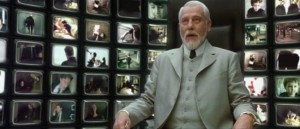Mental Model: The Illusion of Choice

I found myself in a situation today that illustrated the powerful concept of a specific mental model known as the illusion of choice. This theme, of course, is familiar to anyone who has watched The Matrix trilogy, from the scene wherein the architect explains that the key to keeping humanity subdued is providing a system that presented the illusion of choice.
In the real world, you already know about the illusion of choice even if you don’t have words for it. Imagine you are a teenager and you want to study violin. If you are free to choose to study violin, you are going to enjoy it. But if you are forced to do it by your parents or your school district, you are likely to rebel because you don’t think they should be able to make you do something against your will. Thus, you are more likely to be emotionally fulfilled, happy, and, therefore, excel, in violin if you are free to choose to pursue it on your own.
Personally, I short-hand the illusion of choice as follows:
The illusion of choice is a psychological mental model that states humans are happy if they believe that have control over their own actions and can exercise free will. If free will is deprived, or seemingly deprived, from an individual, he or she will become resentful or rebellious, even if the choice forced upon him is identical to the one he would have selected of his own accord.
In other words, if you buy a new car because you want to buy a new car, you’re happy. If you buy a new car because you got in a wreck, you probably aren’t pleased. In both cases, you are getting a new car and the financial cost is likely to the same to you. The difference is the illusion of choice.
The Illusion of Choice Rears Its Head at the Office This Morning
Today, Aaron sits down to his desk and finds that his enormous Power Mac with dual 30″ high definition Apple cinema monitors has experienced a graphics card failure. Not cool. So, we talk about it and decide that instead of buying a new graphics card for several hundred dollars, I will just upgrade my system by purchasing a new one, then rip apart the components in my old Power Mac, which has identical specs to his, instantly doubling his memory, giving him 4 huge internal harddrives, with a working graphics card.
This will result in his system working just fine and having 2x the memory and 2x the storage space and me having a brand new system on my desk. Obviously, that leaves us with two extra 30″ HD cinema displays that won’t be used but we’ll figure that out later. This should be good, right? I should be happy, correct? No. But I’ll get to that in a moment.

I authorized the company to buy a new 27 inch iMac with 2.93 GHz Quad-Core i7 Intel processors, 8 Gigabytes of RAM, a 2 Terabyte hard drive, and a 1 GB ATI Radeon HD 5750 graphics card for my desk at work. After Missouri sales tax, it came to $2,750.87. Because I did it through the American Express rewards program, I should get 4x points, or 11,003 points. That is an extra $110 that I can cash in at a retailer if I ever redeem them in the future.
So not only do all the awesome things I just described happen, I get even more rewards points to spend in the future. I should be happy, right? No.
You see, I had seriously considered buying one of the new Apple systems a few weeks ago right after my mom got hers. But I decided, in what was a momentary quirk, that I was going to purposely deprive myself and continue to build the company’s balance sheet. Now, $2,750.87 is minuscule compared to our revenues each year. But that’s not the point. I had told myself that it was an exercise in self-control. It was “a thing” to me, like someone who says, “No, I’m am going to make myself go to the gym today,” or “No, I am going to make myself mow the lawn”. For the past few weeks, when I sat down to the system, I would be pleased with myself because I thought that a tiny part of our balance sheet was growing because I was depriving myself of something I wanted.
Once I made that choice, I had set in motion something known as “first conclusion bias”. But that is another mental model for another day.
The result is, even though everyone will be happier, we get shiny new toys, and it will happen in time for Christmas, I’m discontent. The reason? It now seems like I have to do it rather than I want to do it. It is the illusion of choice, hardwired into human genetics that makes it difficult, even for me who is aware of the phenomenon, to shake.
The Legacy of Frugality … a Closely Related Trait That Benjamin Graham Warned Exists
It reminds me of a story Benjamin Graham wrote in his autobiography, which I read my sophomore year of college. He said that even though he lived in a $12,000-a-month (in the 1930’s!) townhouse in New York, had a personal masseuse, and lived extremely well, he would sometimes walk instead of take the subway in order to save a nickel or two on tolls. He would feel guilty if he spent the money.
Graham speculated that this personality quirk – guilt over small expenditures that don’t seem important – was a common psychological manifestation that stuck with those who had built their own fortune. Someone who inherited wealth or who was spending someone else’s cash wouldn’t understand it. The same skill that caused one to be wealthy – frugality – sometimes runs almost like an operating software program. Sometimes, it loads itself even when you don’t want it to or expect it to do so … kind of like when you mean to click the Microsoft Excel icon but instead miss and hit the Firefox icon.
The joy for a successful self-made man or woman came from the understanding that he could still control his money and that his money wasn’t controlling him. He wasn’t, in other words, a slave to luxury. This is the illusion of choice.
Ways to Combat the Illusion of Choice
There are several ways to combat the illusion of choice. The most famous three are Hobson’s Choice, Morton’s Fork, and Burdian’s Ass. To summarize:
Hobson’s Choice: A free choice in which only one option is offered; i.e., “take it or leave it”.
Morton’s Fork: Is a choice between two equally unpleasant alternatives (in other words, a dilemma) or two lines of reasoning that lead to the same unpleasant conclusion. It is analogous to the expression, “between the devil and the deep blue sea,” and “between a rock and a hard place”.
Buridan’s Ass is an illustration of a paradox in philosophy in the conception of free will. It refers to a hypothetical situation wherein an ass is placed precisely midway between a stack of hay and a pail of water. Since the paradox assumes the ass will always go to whichever is closer, it will die of both hunger and thirst since it cannot make any rational decision to choose one over the other. The paradox is named after the 14th century French philosopher Jean Buridan, whose philosophy of moral determinism it satirizes.
Thus, to overcome the illusion of choice, you could present an adversary, or even your rebellious teenager, with a Hobson’s choice framed option. “You can either clean your room and go to the movies with your friends, or you can keep your room dirty and stay home. Your choice.” Even though the choices have been restricted, the struggle is going to be far less because the person believed they had a modicum of free will to exercise.
You could also introduce a false Morton’s Fork scenario. Say you want something to take a course of action that is advantageous to you. By presenting two choices, both of which are unpleasant, that will result if they don’t comply with your wishes, you can make them believe they are deciding for themselves. For example, if you were to infuse money into a company on the verge of bankruptcy but you want 80% of the ownership, you could simply point out basic truths: 1.) If you don’t do this, you’ll lose everything and the bank will own 100% of your company, which will be shut down and cease to exist, 2.) If you do manage to hang on, it will take years to rebuild and you’ll have cost your family all of their savings. The third alternative, in contrast, doesn’t look nearly as bad (which gets into the contrast principal, another mental model).
Finally, you could introduce a Buridan’s Ass paradox if you don’t want someone to take action. By overwhelming them with choices, all equally appealing, but making them mutually exclusive, you can effectively cause them to take no action and thus lose all advantage.
I once knew of a successful business owner that was so conflicted about what to do regarding the future of his business that he sat by and over a 5 to 10 year period, watched nearly every penny he had amassed go down the drain. He was unable to make a choice and so his lack of choice became, in effect, a type of choice. He only made a decision once the banks were breathing down his neck, but by then it was too late. His savings were gone, his income depleted, and a fortune squandered. It was tragic. I think he ended up recovering, or at the very least lived decently, but it was still totally unnecessary.
The “Thinking Outside of the Box” Cliche
The rare, successful personality will instantly recognize that the choices are not, in fact, limited. The cliche for this is “thinking outside of the box”. In fact, I think it is fair to say that much of my success has come from being able to make connections other people don’t and seeing choices they don’t even realize exist. After all, most people believe you have to “get a good job with benefits” to survive. Or “If you get a degree in entrepreneurship you will be success.” Instead, I listened to the wiser men, the Peter Lynches and Charlie Mungers, who talked about the importance of logic, ethics, and classical liberal arts education.
My entire career thus far has consisted of making choices other people just don’t see. A lot of this is due to thinking about the world like a spider web instead of a hierarchy.


